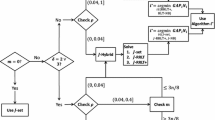Abstract
We show that various duals that occur in optimization and constraint satisfaction can be classified as inference duals, relaxation duals, or both. We discuss linear programming, surrogate, Lagrangean, superadditive, and constraint duals, as well as duals defined by resolution and filtering algorithms. Inference duals give rise to nogood-based search methods and sensitivity analysis, while relaxation duals provide bounds. This analysis shows that duals may be more closely related than they appear, as are surrogate and Lagrangean duals. It also reveals common structure between solution methods, such as Benders decomposition and Davis-Putnam-Loveland methods with clause learning. It provides a framework for devising new duals and solution methods, such as generalizations of mini-bucket elimination.
Preview
Unable to display preview. Download preview PDF.
Similar content being viewed by others
References
Barahona, F., Anbil, R.: The volume algorithm: Producing primal solutions with a subgradient algorithm. Mathematical Programming 87, 385–399 (2000)
Benders, J.F.: Partitioning procedures for solving mixed-variables programming problems. Numerische Mathematik 4, 238–252 (1962)
Blair, C.E., Jeroslow, R.G.: The value function of a mixed integer program. Mathematical Programming 23, 237–273 (1982)
Chvátal, V.: Edmonds polytopes and a hierarchy of combinatorial problems. Discrete Mathematics 4, 305–337 (1973)
Cook, W., Gerards, A.M.H., Schrijver, A., Tardos, E.: Sensitivity results in integer programming. Mathematical Programming 34, 251–264 (1986)
Dawande, M., Hooker, J.N.: Inference-based sensitivity analysis for mixed integer/linear programming. Operations Research 48, 623–634 (2000)
Dechter, R.: Mini-buckets: A general scheme of generating approximations in automated reasoning. In: Proceedings of the 15th International Joint Conference on Artificial Intelligence (IJCAI 1997), pp. 1297–1302 (1997)
Dechter, R., Rish, I.: Mini-buckets: A general scheme for bounded inference. Journal of the ACM 50, 107–153 (2003)
Geoffrion, A.M.: Generalized benders decomposition. Journal of Optimization Theory and Applications 10, 237–260 (1972)
Glover, F.: Surrogate constraint duality in mathematical programming. Operations Research 23, 434–451 (1975)
Hooker, J.N.: Inference duality as a basis for sensitivity analysis. Constraints 4, 104–112 (1999)
Hooker, J.N.: Logic-Based Methods for Optimization: Combining Optimization and Constraint Satisfaction. Wiley, New York (2000)
Hooker, J.N.: A hybrid method for planning and scheduling. Constraints 10, 385–401 (2005)
Hooker, J.N., Ottosson, G.: Logic-based Benders decomposition. Mathematical Programming 96, 33–60 (2003)
Jain, V., Grossmann, I.E.: Algorithms for hybrid MILP/CP models for a class of optimization problems. INFORMS Journal on Computing 13, 258–276 (2001)
Jeroslow, R.G.: Cutting plane theory: Algebraic methods. Discrete Mathematics 23, 121–150 (1978)
Johnson, E.L.: Cyclic groups, cutting planes and shortest paths. In: Hu, T.C., Robinson, S. (eds.) Mathematical Programming, pp. 185–211. Academic Press, London (1973)
Moskewicz, M., Madigan, C.F., Zhao, Y., Zhang, L., Malik, S.: Chaff: Engineering an efficient SAT solver. In: Proceedings of the 38th Design Automation Conference (DAC 2001), pp. 530–535 (2001)
Nedic, A., Bertsekas, D.P.: Incremental subgradient methods for nondifferentiable optimization. SIAM Journal on Optimization 12, 109–138 (2001)
Wolsey, L.A.: The b-hull of an integer program. Discrete Applied Mathematics 3, 193–201 (1981)
Author information
Authors and Affiliations
Editor information
Editors and Affiliations
Rights and permissions
Copyright information
© 2006 Springer-Verlag Berlin Heidelberg
About this paper
Cite this paper
Hooker, J.N. (2006). Duality in Optimization and Constraint Satisfaction. In: Beck, J.C., Smith, B.M. (eds) Integration of AI and OR Techniques in Constraint Programming for Combinatorial Optimization Problems. CPAIOR 2006. Lecture Notes in Computer Science, vol 3990. Springer, Berlin, Heidelberg. https://doi.org/10.1007/11757375_3
Download citation
DOI: https://doi.org/10.1007/11757375_3
Publisher Name: Springer, Berlin, Heidelberg
Print ISBN: 978-3-540-34306-6
Online ISBN: 978-3-540-34307-3
eBook Packages: Computer ScienceComputer Science (R0)




